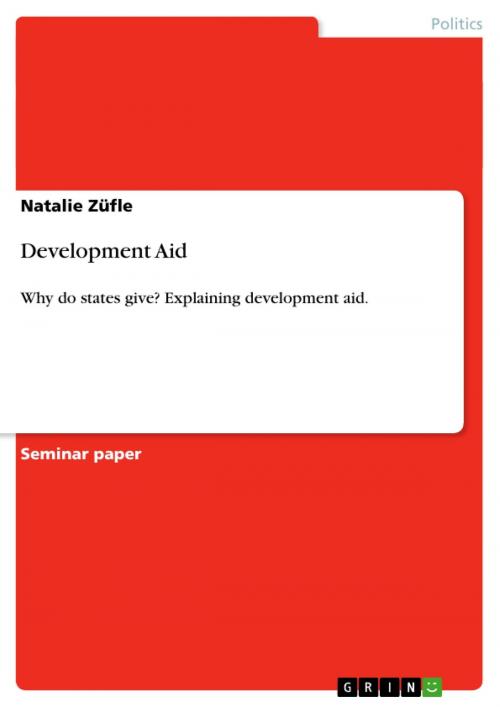Development Aid
Why do states give? Explaining development aid.
Nonfiction, Social & Cultural Studies, Social Science| Author: | Natalie Züfle | ISBN: | 9783656026365 |
| Publisher: | GRIN Publishing | Publication: | October 11, 2011 |
| Imprint: | GRIN Publishing | Language: | English |
| Author: | Natalie Züfle |
| ISBN: | 9783656026365 |
| Publisher: | GRIN Publishing |
| Publication: | October 11, 2011 |
| Imprint: | GRIN Publishing |
| Language: | English |
Seminar paper from the year 2007 in the subject Politics - International Politics - Topic: Development Politics, grade: 1,8, Free University of Berlin (Center for Global Politics), language: English, abstract: In the year 2000 the UN set eight ambitious millennium development goals which shall be reached through a profound development policy until 2015. Among others, the number of people living in poverty should be reduced by 50% and diseases like AIDS or Malaria be stopped. Affluent countries ought to give at least 0.7% of their GDP to poor countries. But this figure has not been achieved by now even approximately. Only a handful of countries give more than this percentage. The average country effort lies at 0.46%, in which the Nordic countries top the set mark (OECD 2007). Development cooperation is indeed an important part in foreign policy of states. Many of the industrialized states have established special ministries for development cooperation or affiliated a likewise branch to their foreign ministries. Additionally, big donor countries often maintain their own national aid agencies. Development aid is given in the form of economic, political or social support to developing countries - either in a bilateral (direct) way or multilateral through international organizations like the UN. Measures (financial aid, technical aid or in the form of consultancy and training) comprise as distinct fields as governance and human rights, economics, health care, environment, education or disaster management.
Seminar paper from the year 2007 in the subject Politics - International Politics - Topic: Development Politics, grade: 1,8, Free University of Berlin (Center for Global Politics), language: English, abstract: In the year 2000 the UN set eight ambitious millennium development goals which shall be reached through a profound development policy until 2015. Among others, the number of people living in poverty should be reduced by 50% and diseases like AIDS or Malaria be stopped. Affluent countries ought to give at least 0.7% of their GDP to poor countries. But this figure has not been achieved by now even approximately. Only a handful of countries give more than this percentage. The average country effort lies at 0.46%, in which the Nordic countries top the set mark (OECD 2007). Development cooperation is indeed an important part in foreign policy of states. Many of the industrialized states have established special ministries for development cooperation or affiliated a likewise branch to their foreign ministries. Additionally, big donor countries often maintain their own national aid agencies. Development aid is given in the form of economic, political or social support to developing countries - either in a bilateral (direct) way or multilateral through international organizations like the UN. Measures (financial aid, technical aid or in the form of consultancy and training) comprise as distinct fields as governance and human rights, economics, health care, environment, education or disaster management.















